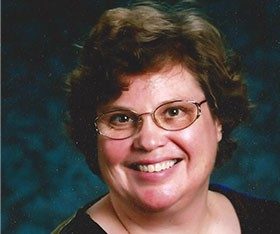Jennice Ozment, M.A.

Jennice Ozment
High School Chemistry Teacher
Walton High School, Cobb County School System
B.S., Chemistry, Southwest Texas State University, San Marcos
M.A., Teaching, Chemistry, Kennesaw State University, GA
Jennice Ozment has been teaching high school chemistry at Walton High School in Cobb County, Georgia, for six years. She spent 20 years working in the paper and oil & gas industries before transitioning into teaching. Two semesters worth of tertiary oil recovery research as an undergrad helped to launch her career, which steadily progressed into positions of increasing responsibility with international research projects and achievements during this tenure. However, the company she was working for in 2004 was shut down, and Ozment decided to stay at home, immersing herself into volunteer activities at her sons’ high school.
Fortunately, her involvement at the local high school led to substitute teaching, which turned into a full-time teaching position. Ozment says her own high school teacher, Mrs. Johannessen, ignited her interest in chemistry. She now seeks to do the same for the next generation. She says, “I like to see a student’s eyes light up when they ‘get it’.”
She received the Hach-ACS scholarship for chemists who want to change careers and become teachers, and she credits the ACS for allowing her to explore this opportunity. She earned a Master’s of Arts in Teaching in chemistry, and has served as the lead on-level chemistry teacher at Walton High School. She also serves as the chief chemical safety officer at the school where she is in charge of making sure safety equipment is in proper working order, chemicals are inventoried and stored correctly, and that the faculty is properly trained.
Your greatest strength can also be your greatest weakness.
How did you decide to become a chemist:
My high school chemistry teacher, Mrs. Johannessen (Mrs. Jo for short), ignited my interest in chemistry. She was very positive, patient, and an incredible teacher. I took 2 years of chemistry from her and was her lab assistant my senior year. Not only did she teach me chemistry, she showed me how a great teacher cares about her students, doesn't give up on them, and continually gives them positive feedback. She attended my wedding, held our first born son in her arms, and has been my friend for these last 34 years. Mrs. Jo has always been and will always be an inspiration to me.
Typical day on the job:
I arrive at school each morning around 7:45 and have cafeteria duty from 8:05-8:15. School starts at 8:20. I teach 2 classes in a row from 8:20 to 10:30 and then have 55 minutes for planning. I teach another class from 11:35 until 12:30 in the afternoon, and then I get 55 minutes for lunch. I teach 2 more classes from 1:35 to 3:30. I am usually at school until 6:00 pm setting up experiments and/or demos, cleaning up experiments and/or demos, making copies, tutoring, planning, grading or doing paperwork.
Work environment:
I have a classroom that holds 28 student desks, my desk and demo table, 7 lab benches, a safety
shower and eye wash station, a fume hood, a handicap lab station and some cabinet storage on the walls. It is my classroom—I do not have to share it. We average 1.5 labs per week.
I also have 2 desktop computers, 2 bookcases loaded with reference materials, all kinds of plastic storage bins filled with items to do demos or labs, 30 hanging lab aprons for my students and my goggle cabinet. Inside are 30 psychedelic colored goggles and the outside, well, you just have to look at the picture!
Lastly, in the front of the room by my whiteboard and smartboard are my "gadgets": lava lamp, glitter lamp, plasma ball, fiber optic light, wave machine, and 2 phosphorescent lamps, all lined up on a table.
And how could I forget? My “Ashes of Problem Students” jar—with ashes!
Work schedule:
I put in around 80 hours a week. I'm usually at school 10-11 hours/day, and then I go home and grade papers or work on lesson plans for about 3-4 hours each night and 10-15 hours on the weekends. The environment is insanely busy!
Tools you can’t live without:
Microsoft Office, SigmaPlot, and Edmodo.
Best productivity trick:
Work the week between Christmas and New Year’s; no one else does, and you will get tons of things done. Getting in early or staying late gives you time to get things done before the work day and interruptions begin or after the work day and interruptions end.
Best career advice you’ve received:
Your greatest strength can also be your greatest weakness. For example, my greatest strength is the fact that I am extremely organized, which means I usually don’t miss anything when I’m doing a project. But being organized is also my greatest weakness. I tend to focus so much on staying organized and making sure all the “t’s” are crossed and the “i’s” are dotted that I miss the big picture. I lose my ability to “think outside the box” and to perhaps make a significant contribution.
Skills or talents that make you a good fit for your job:
I want to help people succeed.
Essential habit you wish you’d started earlier:
Not sleeping in so long on the weekends. You can really get a lot done with a few extra hours in the morning.
Favorite ACS resource:
Journal of Chemical Education. It’s a great source for new demos and inquiry ideas, love it!

